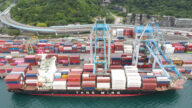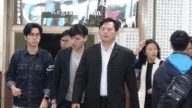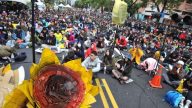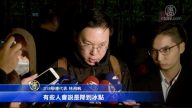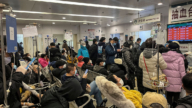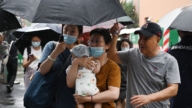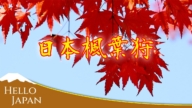【新唐人2014年04月01日讯】日前,台湾50万名学生与民众,前往总统府前凯达格兰大道,表达反服贸诉求。运动结束后,人潮快速散去,整个过程和平理性,台湾各大媒体给予全程报导并高度肯定。而同一天,广东省茂名市民为抗议当地政府兴建PX化工厂,与警方发生激烈冲突,导致多人死亡,数百人受伤的惨剧,然而,消息却遭到全面封锁。有分析指出,这正好反映了海峡两岸政治体制的不同。
3月30号,面对层层拒马、蛇龙保护的台湾总统府,50万身穿黑衣、手持太阳花的台湾学生与民众,前往总统府前的凯达格兰大道,坚定的喊出:“退回服贸!捍卫民主!”
当晚7点30分,活动总指挥林飞帆发表了17分钟演说,他表示,总统马英九29号在记者会上,针对学生提出的四项要求,并没有做出任何具体承诺,因此,占领国会的行动将持续下去。演说结束后,林飞帆一声令下,50万人随即有秩序的散场,约半个小时就清空凯道,现场的垃圾也被净空,整个过程和平理性。
旅美政论家伍凡:“台湾的老百姓在民主制度下,老百姓和政府的互动是平和的,并且要求提的非常明确,政府也一再回答,但是没有达成协议,现在还在继续,要进行公民运动,进行抗议,要反服贸。同时在现场,也有支持反反服贸的,但是他也没有去干扰反服贸的人,双方都是平和的把意见讲出来。我想这是民主制度下,民主的文化塑造了一批有民主文化素养的老百姓。”
有台湾学者在示威现场表示,服贸协议事前黑箱作业,人们要求公民参与、政府信息公开以及人权保障。
时事评论员蓝述:“服贸为什么在台湾引起了如此强烈的反弹,就是因为台湾人民担心将来通过类似于服贸等等两岸合作,台湾越来越受到大陆的控制。他们担心将来有一天连反服贸的游行都不能搞了,搞不好有一天台湾就变成像大陆一样,你想示威,都不准你示威了,或者你去示威,没人给你报导了,所有新闻都被封锁了。”
据了解,针对330反服贸运动,台湾各大媒体给予全程报导,不少媒体称赞这场“太阳花学运”写下了历史新页,不少国际媒体也给予高度肯定。
然而,海峡对岸的民众维权就没有那么顺利了。
3月30号早上8点,广东省茂名市上万市民举行示威游行,他们手持“PX专案滚出茂名”、“保护市民健康”等标语,抗议当地政府计划兴建PX(二甲苯)化工厂。当天晚上7点,市民再次聚集市政府,广东当局出动大批武警和官兵镇压,并使用催泪弹、高压水枪等方式强制驱离,双方爆发激烈冲突。
伍凡:“PX工厂是非常剧毒的化学工业,现在中国起码10几家了,都在居民区附近。老百姓为了保护他们自己和后代,他们抗议,遭到武力镇压,这事情在中国最近这几年频频发生,屡见不鲜。这就是一个共产制度,专制独裁制度,为了所谓的经济利益,实际上是为了维护共产政权的利益,不考虑老百姓的死活,跟台湾的做法完全相反。”
针对这起警民冲突事件,茂名当地媒体没有报导,互联网上相关微博帖子也遭到删除。31号,有网友发布消息说,已有8人死亡,80多人重伤,200多人轻伤。
蓝述:“同样的文化背景,但是两种不同的政治制度之下,民众所拥有的自由是完完全全不一样的。”
伍凡:“专制独裁的制度,是没有言论自由、没有新闻自由、没有出版自由,也没有网路自由,通通封锁消息。台湾是把消息向全世界公布,只要不危害国家利益的,不是作为保密性质的,都可以公开。可是中国呢,大事、小事,通通是国家秘密,只能由官方的新华社记者写出通稿,发到全国。”
31号,有网友在微博说,祖国的未来不是化学工程,而是在排放毒气的化学工程毒害了孩子们,孩子的未来在哪里?我们老了,不用多久就会离去,可是孩子怎么生存?
采访/朱智善 编辑/陈洁 后制/陈建铭
Taiwan’s 330 Anti-Trade Pact vs. Guangdong Demonstration
Recently, 500,000 Taiwanese gathered in front of the
Presidential Palace protesting against the cross strait trade pact.
The entire process went through peacefully and rationally and
the crowd left immediately after the protest, receiving much
praise from the media.
On the same day, a demonstration also took place in Maoming
city of Guangdong Province against a local government decision
to build a PX chemical plant.
Clashes occurred between the protestors and the police
resulting in many deaths and hundreds injured.
The news was completely blocked.
It is analyzed that the two demonstrations reflect the difference
between
the political systems across the Taiwan Strait.
On March 30, Taiwan Presidential Office was protected by
layers of knife rest and gabion.
Around 500,000 Taiwanese wearing black and holding
sunflowers arrived in front of the Presidential Office shouting
firmly, “Reject trade pact, Defend democracy."
At 7:30PM, the event commander Lin Feifan delivered a
17 minute speech stating that President Ma Ying-jeou did not
address students’ request with concrete answers on the 29th at
the press conference,
therefore, the activity to occupy congress will continue.
After finishing his speech, Lin Feifan dismissed the crowd.
In half of an hour, the crowd was gone, the garbage on the
street was cleared, and the entire process was peaceful
and sensible.
Wu Fan, political commentator: “Under democracy,
Taiwanese share mutual and peaceful interactions with the
government.
Their demands are clear, and the government responds.
Even though no agreement was reached, they will continue
the civil movement and the protest against the trade pact.
There were also people opposing the protest.
But they did not interfere with the protestors.
Peacefully, they exchanged their opinions.
I think this shows how democracy can shape and cultivate
people of civilization."
Taiwan scholars participating in the demonstration opposed the
behind closed doors trade pact, and indicated that people
demand citizens’ participation, open governmental information
and protection of human rights.
Lan Su, commentator: “Why did the cross-strait trade pact
cause such a strong rally?
It is because people in Taiwan worried cross-strait
cooperation through the trade pact will lead to further control
of Taiwan by China.
They worried that protests such as this can not even be
guaranteed one day.
Taiwan might become like China, where no protest is allowed,
or the protest is not reported, and all news is blocked."
The March 30 demonstration, known as the sunflower
movement, has received full media coverage.
Many media, including international media, have praised this
sunflower movement for its historical insight.
However, the protestors across the Taiwan Strait were not so
lucky.
At 8AM of March 30, tens of thousands of people in Maoming,
Guangdong Province, protested against the local government
plans to build the PX (xylene) chemical plant.
In the demonstration,they held slogans stating “PX project,
Get out of Maoming," and “Protect the public health."
At 7PM, people gathered again in front of the Municipal
Government.
The Guangdong authorities dispatched a large number of
armed police and soldiers to conduct forced eviction using
tear gas and water cannons.
Violent clashes broke out.
Wu Fan: “The PX plant is a very poisonous chemical industry.
There are at least a dozen of these plants in China, situated in
residential areas.
For their own and the next generation’s future, they protest
but only meet armed suppression.
It has been so frequent in China these years.
This is the Communist system, the autocratic regime.
The so-called economic interests care for none of the people’s
interests but that of the regime.
It is exactly the opposite approach of Taiwan."
Local media had no report of this clash.
Posts on the Internet were deleted.
On the 31st, netizens revealed through the Web saying that
at least 8 died, 80 seriously injured, and 200 minor injured.
Lan Su: “With the same cultural background, but people share
completely different freedom under two different political
systems."
Wu Fan: “There is no freedom of speech, media, press, or
Internet under the dictatorial regime. Everything is blocked.
But, Taiwan keeps everything public to the world, as long as
it does not violate the national interest and confidentiality.
While in China, be it small or big, everything is a national secret.
Only official notice from Xinhua News Agency can be reported."
A netizen stated on the Weibo on the 31st:
The chemical industry is not our future, but these toxic
chemicals are killing our children.
What is our children’s future?
We will soon be gone as we are old, but what about our children?
Interview/Zhu Zhishan Edit/Chen Jie Post-Production/Chen Jianming


